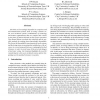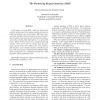85 search results - page 13 / 17 » The Complexity of Bribery in Elections |
IEEEARES
2006
IEEE
14 years 3 months ago
2006
IEEE
Elections are increasingly dependent on computers and telecommunication systems. Such “E-voting” schemes create socio-technical systems (combinations of technology and human o...
IPPS
2006
IEEE
14 years 3 months ago
2006
IEEE
In this paper we present MRI, a high level interface for selective monitoring of code regions and data structures in single and multiprocessor environments. MRI keeps transparent ...
SPDP
1993
IEEE
14 years 1 months ago
1993
IEEE
This paper presents a solution to the (processor) group membership problem. The methodology followed in designing the algorithm is summarized by the option to optimize the perform...
WOTE
2010
13 years 8 months ago
2010
Optical mark-sense scanning has lead to a resurgence in the use of paper ballots in the United States, despite a century of strong competition from paperless direct-recording votin...
CORR
2010
Springer
13 years 9 months ago
2010
Springer
One possible escape from the Gibbard-Satterthwaite theorem is computational complexity. For example, it is NP-hard to compute if the STV rule can be manipulated. However, there is...


